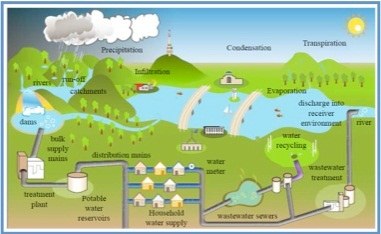ITACA
Integrated Modelling Control and Supervision Techniques with Application to the Water Cycle, DPI2006-11944
Project Description

- Allocation of limited water resources,
- Quality of service to users,
- Avoidance of flooding due to rainwater exceeding urban drainage capacity,
- Avoidance of polluting discharges to the receiving waters in urban drainage, among many others.
The computation and implementation of the control strategies is associated to the use of telemetry and telecontrol systems. Demonstrators of the achievable benefits will be developed, based on real cases supplied by the collaborating companies.
Project Publications
- C. Ocampo-Martínez and V. Puig. Fault-tolerant model predictive control within the hybrid systems framework: application to sewer networks. International Journal of Adaptive Control and Signal Processing, 23(8): 757-787, 2009. <DOI: 10.1002/acs.1099>
- C. Ocampo-Martínez, V. Puig, G. Cembrano, R. Creus and M. Minoves. Improving water management efficiency by using optimization-based control strategies: the Barcelona case study. Water Science & Technology: Water Supply, 9(5): 565-575, 2009. <doi:10.2166/ws.2009.524>
- V. Puig, G. Cembrano, J. Romera, J. Quevedo, B. Aznar, G. Ramón and J. Cabot. Predictive optimal control of sewer networks using CORAL tool: application to Riera Blanca catchment in Barcelona. Water Science & Technology, 60(4): 869-878, 2009. <http://dx.doi.org/10.2166/wst.2009.424>
- V. Puig, J. Romera, J. Quevedo, S. Cardona, A. Salterain, E. Ayesa, I. Irizar, A. Castro, M. Lujan, P. Charbonnaud, P. Chiron and J. Trouvat. Optimal predictive control of water transport systems: Arrêt-Darré/Arros case study. Water Science & Technology, 60(8): 2125-2133, 2009. <http://dx.doi.org/10.2166/wst.2009.525>
- V. Puig, C. Ocampo-Martínez, G. Cembrano, R. Creus and M. Minoves. Improving water management efficiency by using optimal control strategies: the Barcelona case study, 10th IWA Conference on Instrumentation, Control and Automation, 2009, Cairns, Australia, pp. 1-9, IWA-ICA.
- C. Ocampo-Martínez and V. Puig. On modelling approaches for receding-horizon control design applied to large-scale sewage systems, 48th IEEE Conference on Decision and Control, 2009, Shanghai, pp. 8052-8058, IEEE.
- C. Ocampo-Martínez. Model predictive control of wastewater systems. Volume 30 of Advances in Industrial Control. Springer, 2011.
Comparteix: